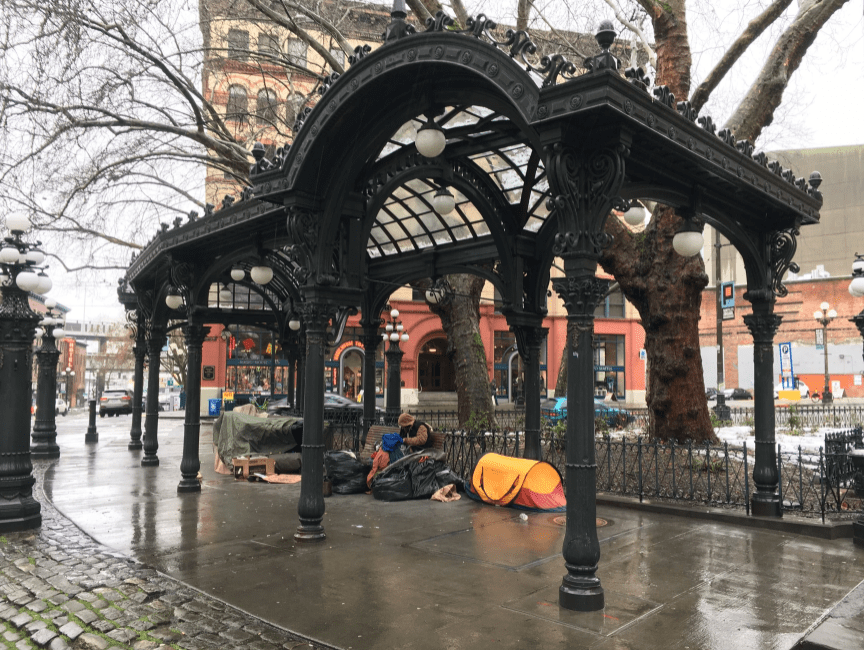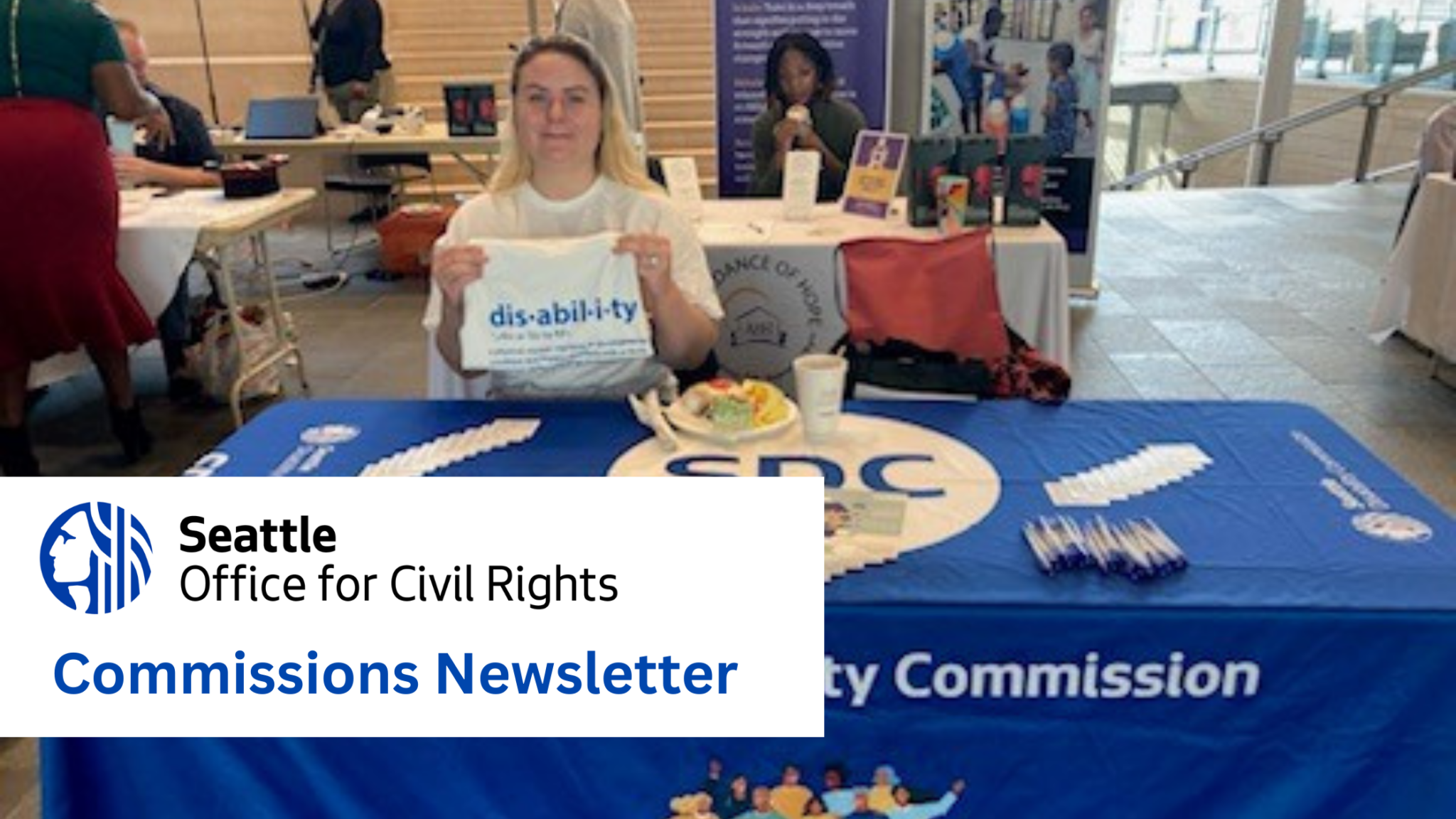
By Seattle Human Rights Commission
The following letter was transmitted to the Seattle City Council and King County Council.
Seattle, and King County generally, has suffered from a houselessness problem for decades. The houseless population is skyrocketing, and this phenomenon shows no sign of slowing down. The deluge of newly houseless – stemming from the eviction crisis, the unemployment crisis, the COVID-19 pandemic, and the negative impacts of climate change – will only make the issue, and the plight of the unhoused, even more pronounced and acute.
The patchwork of solutions for the unhoused are many and varied; ranging from addressing root causes, such as high adverse childhood experiences (ACEs), substance abuse disorders, disability, and mental wellness, to dealing with the manifestations of being unhoused. Many municipalities have uncovered that the first step to solving the houselessness problem is with a housing first approach, i.e. providing unhoused people with houses. This addresses the structural causes of houselessness instead of trying to “fix” the people experiencing it. This is the belief of the community members that are players in the houselessness ecosystem. The right to adequate housing is a human right – according to the United Nations.
With this in mind, we recommend that the City and County fund and release at least $240,984,576 of immediate housing vouchers to house 8,6611 individuals [1] in a median market one bedroom apartment. This action would support our unsheltered and sheltered immediate homeless community members for a single year.
We also recommend that the City and County work together with the Federal government, the Department of Housing and Urban Development (HUD), the philanthropic investment ecosystem, and the private sector to raise and allocate $12,025,000,000 for new affordable housing units. It is a given that the Seattle Human Rights Commission expects both the City and County to understand and incorporate a racial equity lens as mandated by multiple City and County law.
The above recommendations are grounded in community insight and supported by the baseline numbers in McKinsey and Company’s January 22, 2020 report titled “Why does prosperous King County have a homelessness crisis?” (Figure 1). McKinsey’s report found that 37,000 additional affordable housing units would need to be built to stably house all homeless and “rent burdened” households. Assuming that the cost of a new affordable unit is approximately $325,000, this translates into $12,025,000,000 being needed – the genesis of our second recommendation.
Figure 1: Spending Needed for Addressing Houselessness in King County

Source: Why Does Prosperous King County Have a Homelessness Crisis, McKinsey. Jan 20, 2020
It is important to highlight that following the above recommendations would not only be a meaningful step in averting the impending houselessness tsunami, it would also save the City and County money. A report from the Morrison Institute for Public Policy [2] quantified the cost savings at about $21,000 per year for each chronically mentally ill person who has stable housing and support services – breaking the expensive cycle of emergency room visits, police interactions and incarceration. The average criminal justice costs for a homeless person with chronic mental illness is about $5,400 per year, with about $2,700 of that in police costs and the remainder for incarceration and court costs. For the person in supportive housing, it’s about $3,300 a year, with about $2,000 in police costs.
We demand that the City and County take immediate steps above to 1) use a trauma informed approach to stop the dehumanization of our unhoused communities, and 2) spotlight and actively reduce the heinous acts currently being performed on the unhoused. You may find more details on this recommendation in the 2021 Seattle Human Rights Fellows report on “Protecting Human Rights”, which is available at http://bit.ly/ProtectingHumanRights, (page 105). Our community partners have highlighted that there have been 889 encampments fires in 2021 as of September 15th, 2021 [3]. Many of the incidents are arson from outside sources; with several being set while unhoused community members sleep. We know that the City and County Councilmembers are best equipped to operationalize this recommendation and make it relevant to their functions and applicable to their portfolios.
We understand that funds have been allocated in the Recovery Act specifically for houselessness. It is our hope that remaining funds, as well as new funds from HUD programs can be used to address this issue.
Years of underfunding, mismanagement, and not taking the necessary initial steps in addressing this problem have led to our current situation. Unfortunately, the price tag for solving this issue is only going to increase the longer we wait [4]. It is time that our City and County budgets reflect our values of human rights, specifically in solving the homelessness crisis.
Sincerely,
Seattle Human Rights Commission
- The January PIT count for only Seattle states that there are 8,661 individuals in need of housing. It should be noted that this number does not account for other forms of homelessness; according to the Department of Health and Urban Development’s definitions for the insecurely housed.
- Julia Bausch, Alison Cook-Davis, Benedickt Springer. “Housing is Health care: The Impact of Supportive Housing on the Costs of Chronic Mental Illness”. Morrison Institute for Public Policy report. May 2021. https://morrisoninstitute.asu.edu/sites/default/files/housing_is_health_care_report_2021.pdf
- Kara Kostanich. “Businesses call on city to prioritize safety as homeless camp fires explode across Seattle”. KOMO News. Sept. 15th, 2021. https://komonews.com/news/local/businesses-call-on-city-to-prioritize-safety-as-homeless-camp-fires-explode-across-seattle
- Lavena Staten. “Penny Wise But Pound Foolish: How Permanent Supportive Housing Can Prevent a World of Hurt”. July 14th, 2019. https://papers.ssrn.com/sol3/papers.cfm?abstract_id=3419187


